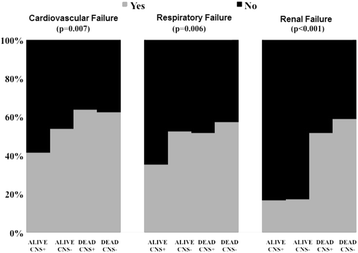The impact of extracerebral organ failure on outcome of patients after cardiac arrest: an observational study from the ICON database
- PMID: 27839517
- PMCID: PMC5108077
- DOI: 10.1186/s13054-016-1528-6
The impact of extracerebral organ failure on outcome of patients after cardiac arrest: an observational study from the ICON database
Abstract
Background: We used data from a large international database to assess the incidence and impact of extracerebral organ dysfunction on prognosis of patients admitted after cardiac arrest (CA).
Methods: This was a sub-analysis of the Intensive Care Over Nations (ICON) database, which contains data from all adult patients admitted to one of 730 participating intensive care units (ICUs) in 84 countries from 8-18 May 2012, except admissions for routine postoperative surveillance. For this analysis, patients admitted after CA (defined as those with "post-anoxic coma" or "cardiac arrest" as the reason for ICU admission) were included. Data were collected daily in the ICU for a maximum of 28 days; patients were followed up for outcome data until death, hospital discharge, or a maximum of 60 days in-hospital. Favorable neurological outcome was defined as alive at hospital discharge with a last available neurological Sequential Organ Failure Assessment (SOFA) subscore of 0-2.
Results: Among the 469 patients admitted after CA, 250 (53 %) had had out-of-hospital CA; 210 (45 %) patients died in the ICU and 357 (76 %) had an unfavorable neurological outcome. Non-survivors had a higher incidence of renal (43 vs. 16 %), cardiovascular (56 vs. 45 %), and respiratory (62 vs. 48 %) failure on admission and during the ICU stay than survivors (all p < 0.05). Similar results were found for patients with unfavorable vs. favorable neurological outcomes. In multivariable analysis, independent predictors of ICU mortality were renal failure on admission, high admission Simplified Acute Physiology Score (SAPS) II, high maximum serum lactate levels within the first 24 h after ICU admission, and development of sepsis. Independent predictors of unfavorable neurological outcome were mechanical ventilation on admission, high admission SAPS II score, and neurological dysfunction on admission.
Conclusions: In this multicenter cohort, extracerebral organ dysfunction was common in CA patients. Renal failure on admission was the only extracerebral organ dysfunction independently associated with higher ICU mortality.
Figures



References
-
- Bro-Jeppesen J, Kjaergaard J, Wanscher M, Nielsen N, Friberg H, Bjerre M, et al. The inflammatory response after out-of-hospital cardiac arrest is not modified by targeted temperature management at 33 degrees C or 36 degrees C. Resuscitation. 2014;85:1480–1487. doi: 10.1016/j.resuscitation.2014.08.007. - DOI - PubMed
Publication types
MeSH terms
LinkOut - more resources
Full Text Sources
Other Literature Sources
Medical

